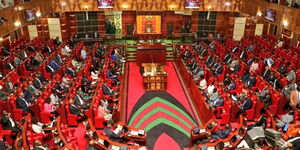On Friday, March 29, the Chairman of the Presidential Council of Economic Advisors David Ndii came out to address the basic economic principle that he claimed was behind the sudden gain of the Kenyan shilling.
Ndii argued that the sudden appreciation of the local currency was mainly due to an external, random variable called 'Sunspots.'
Taking into consideration Ndii's argument of sunspots, the sudden appreciation of the local currency was mainly due to external factors which influenced the financial markets.
"I keep asking you which fundamentals were driving the free fall. Seems y’all missed this class," Ndii commented even as he expounded his argument.
Factors such as investors' sentiment, expectations, reactions to non-economic events, or novelty indicators can be classified as sunspots.
David Ndii was compelled to issue the explanation after questions were raised on the sudden stability of the shilling against the dollar.
A section of Kenyans demanded to know the exact fundamentals that made the shilling move that much over a short period and whether it was sustainable.
"Any attempt at explaining the appreciation of the shilling against the green buck in the last month or so should start with the steep depreciation that preceded the current rise. What caused the depreciation? was it a change of fundamentals?" questioned a Kenyan.
As of Thursday, March 28, commercial banks quoted the shilling at 131.00/132.00 against the dollar, a significant improvement within a week, comparing its performance to last Thursday, March 21, when the rate stood at 132.00/133.00.
The stability of the shilling has mainly been attributed to the oversubscription of Infrastructure bonds issued by the national treasury in January this year.
While the government sought to raise Ksh70 billion from the issuance of infrastructure bonds, the government received Ksh241 billion in offers from investors.
The government buyback of the Ksh310 billion ($2 billion) Eurobond maturing in June this year was serviced by a new Eurobond worth Ksh230 billion ($1.5 billion) issued by the government in February.
Moreover, tea exportation played a significant role in shilling stability. Reports suggest the sector was now contributing Ksh180 billion.

8 Confirmed Dead After Truck Plunges Into River News Just In











